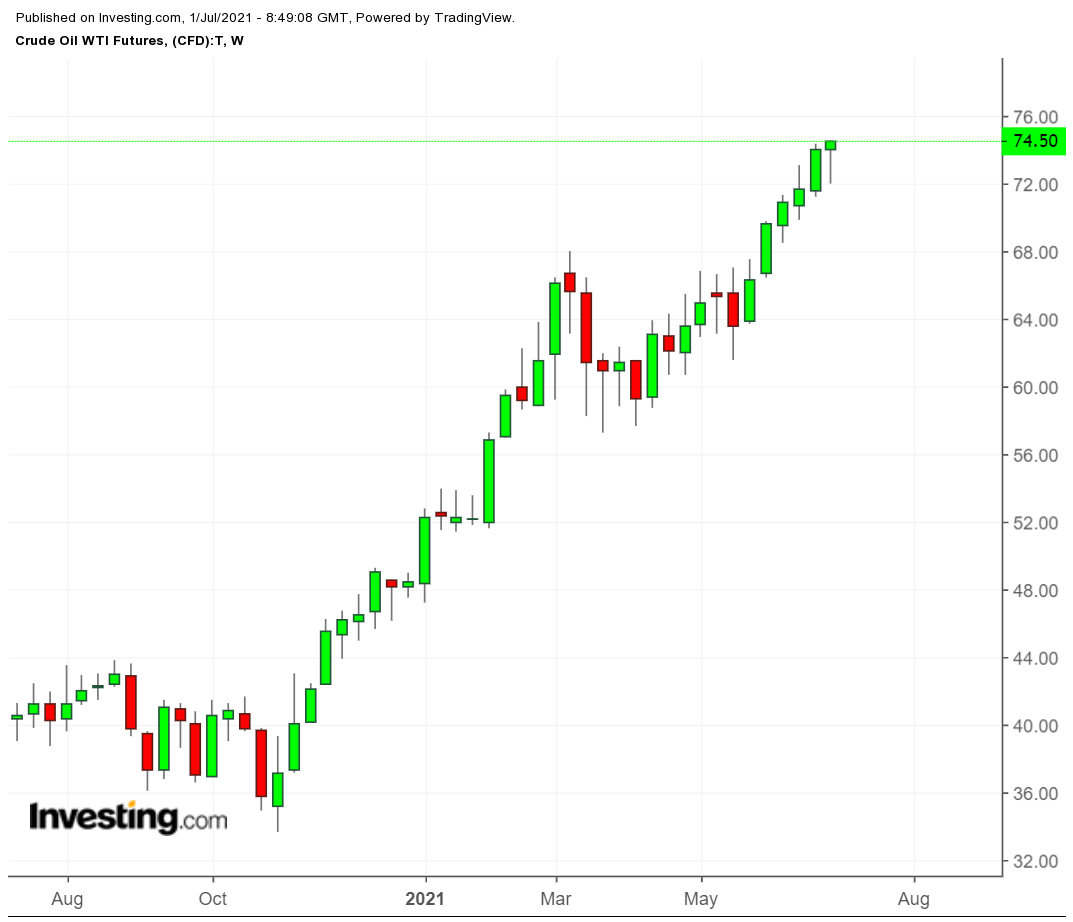OPEC+'s meeting today—Thursday, July 1—is of particular interest because the price of oil is relatively high (both the WTI and Brent oil benchmarks are close to $75 per barrel) and gasoline prices are rising across the United States as well.

OPEC+ will be faced with the need to make an important decision—what to do about oil production in August, and possibly the rest of 2021.
According to terms agreed upon earlier in the spring, the group is supposed to increase production slightly in July. The July 1 OPEC+ meeting will focus on what comes next, as the group’s current plans call for leaving output steady after July.
The rumors are similar to what we’ve heard all year—Russia favors increasing production in August and September, but Saudi Arabia favors taking a more cautious line. Kazakhstan favors Russia’s position, and Nigeria also favors increasing output. Kuwait is following Saudi Arabia’s cautious approach.
Most energy market analysts believe OPEC+ will raise the numbers in August, somewhere in the range of 500,000 bpd to 1 million bpd. However, Saudi Arabia’s very cautious messaging has cast doubts on whether it will agree to increase production that much.
On the one hand, there is evidence suggesting that the oil market is tight and that demand is about to outstrip current supply, thus warranting the increase. On the other, we have contrary indications offering that the oil market supply isn’t actually as tight as prices indicate and that the oil market could easily become oversupplied.
Let's take a closer look at both arguments.
1. Tight Oil Market – Increase Production
A report reviewed by the OPEC+ Joint Technical Committee (JTC) on Tuesday, June 29, showed that the oil market is currently in a deficit and will remain so in the short term.
Demand for oil is rising. In the U.S., demand for gasoline and diesel is up and oil stored on tankers offshore fell by 17% last week.
Banks and hedge funds seem confident that prices will continue to rise and have placed their bets accordingly. Oil production in the U.S. has remained stable at around 11 million bpd. With higher prices, some companies are drilling more, but most are not expanding production.
And airlines are preparing for an increase in air travel, which would consume more jet fuel.
These signs would indicate that OPEC+ should increase production to supply a market that is thirsty for crude oil. These signs also indicate that adding to the oil supply wouldn’t push prices down much, if at all. Rather, upping stockpiles could keep prices from rising to a level that would result in an economic recession, or hurt demand.
2. Weak Oil Market – Cautious Production Approach
The oil market appears tight because OPEC+ is still holding 5.9 million bpd of oil off of the market. JTC's oil market report shows that if OPEC+ bumps up by another 5.9 million bpd over the next 8 months, the oil market will be oversupplied in 2022 even with expected demand growth.
Global oil inventories also remain high, despite some big drops over the past few months. Oil stored at sea has dropped, but only to April 2020 levels. China has cut the amount of oil its independent refineries are allowed to buy in the second half of 2021 by 35%. Iran is also poised to increase exports by as much as 1 million bpd if negotiations with the United States lead to the removal of oil sanctions.
These signs would indicate that OPEC+ should take a conservative approach to the oil market and avoid increasing oil production too much—or at all. Pessimism about the coronavirus may also factor in. If it looks like economies will shut down over fears of new strains, OPEC+ may be even more inclined to refrain from or minimize any production increases.
Conclusion
In the end, it is likely that Saudi Arabia and Russia will work out a deal that will satisfy some of Russia’s need to up output, but will also avoid putting too much oil back on the market. Saudi Arabia has shown that it is willing to cut its own production while agreeing to elevation in Russian production, so it may do so again if the two powers can’t agree on an approach.
With OPEC+’s new policy of holding monthly meetings, and with the ease of holding these meetings virtually, it is too easy for the members to simply push off big decisions. They can reconsider in another 4 weeks or so. That is why most analysts doubt that OPEC+ would make any major decisions or drastically change the market.
